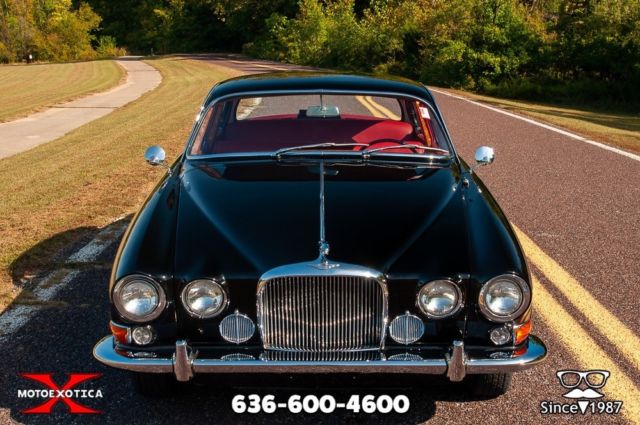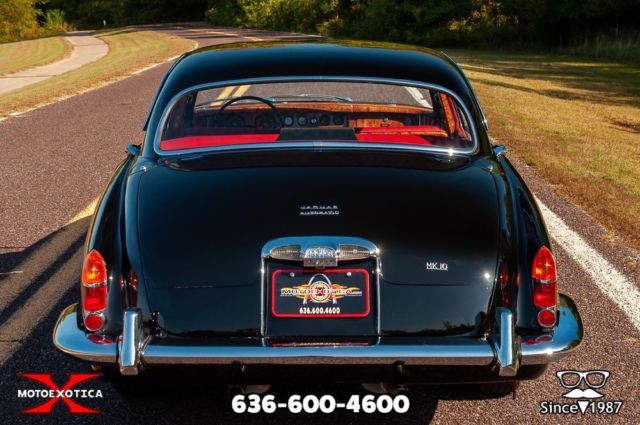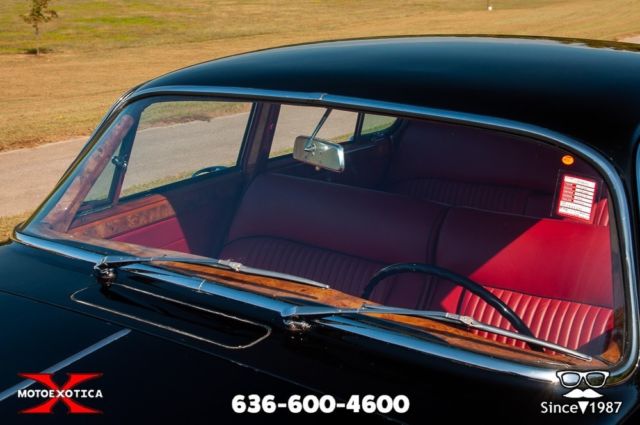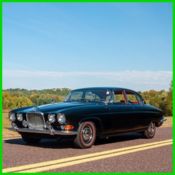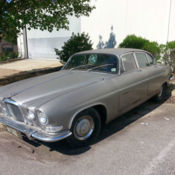1964 Jaguar Mark X Saloon
Technical specifications of Jaguar Other 1964
| Price: | - |
|---|---|
| Item location: | Saint Louis, Missouri, United States |
| Make: | Jaguar |
| Model: | Other |
| SubModel: | Jaguar Mark X Saloon |
| Type: | Sedan |
| Trim: | Mark X Saloon |
| Year: | 1964 |
| Mileage: | 58,813 |
| VIN: | 353588BW |
| Color: | Black |
| Engine size: | 3.8L straight six |
| Number of cylinders: | 6 |
| Transmission: | Three-speed Automatic |
| Drive type: | RWD |
| Interior color: | Red Leather |
| Vehicle Title: | Clear |
| You are interested? | Contact the seller! |
Description
1964 Jaguar Mark X Saloon Description1964 Jaguar Mark X Saloon
One of 13,382 Mark Xs made in 1964, include 5,775 for export First Jaguar Saloon to feature independent rear suspension Black exterior with red leather interior 8L inline six-cylinder engine with triple SU carburetors Borg-Warner DG 250 three-speed automatic transmission and 3.54 gearing Air-conditioning, power steering, power four-wheel disc brakes and power windows Rear seats feature fold-down trays and fold-down center armrest Redline Coker Classic tires More than $4K in service records Comes with Jaguar Daimler Heritage Trust certificateSeeking a classic imported luxury car that is not a full-size Mercedes-Benz or big BMW? MotoeXotica Classic Cars has a possible solution with this 1964 Jaguar Mark X Saloon.
Made on March 16, 1964 at Jaguar’s Coventry, England factory, where it left painted Opalescent Dark Green (code 2638) with Suede Green interior. It was dispatched on April 7, 1964 via Jaguar Cars in New York, NY.
About 10 years ago, the car was repainted and reupholstered – the exterior is now black while the interior is red leather. The paint and trim are in excellent overall condition. The windows are clear and intact while the car’s lights are haze-free and intact. The car’s bodywork is straight and solid including the chrome bladed bumpers.
The area under the bonnet (hood) is extremely tidy, the battery appears new while the boot (trunk) is in very good overall condition, complete with full-sized spare tire and cover. This classic cat rolls on Coker Classic redline tires, size P195/70R14 at all four corners and each tire is mounted on a steel wheel topped with factory wheel cover. The tires and wheel covers are all in very good order.
Under the hood is Jaguar’s venerable 3.8L straight six motor breathing via triple SU carburetors and dual exhausts and backed by a Borg-Warner DG250 three-speed automatic transmission and a 3.54:1 rear end. Driver convenience features include air-conditioning, power steering, power four-wheel disc brakes and power windows.
Inside, the car’s red leather interior is quite eye-catching and complements the exterior well. The supple leather is very inviting and the burled walnut accents on the door panels, instrument panel and center console inject warmth. The front and rear seats are in excellent shape, as is the matching carpet. The factory two-spoke steering wheel is present and looks great. The dashboard and inner door liners are in nearly impeccable condition. Even the center console looks fantastic. The interior was Jaguar’s last to feature abundant standard woodwork, including the dashboard, escutcheons, window trim, a pair of large bookmatched fold out rear picnic tables, and a front seat pull-out picnic table stowed beneath the instrument cluster.
The Jaguar Mark X (Mark Ten) was British manufacturer Jaguar’s top-of-the-range saloon for a decade, from 1961 to 1970. The large, luxurious Mark X succeeded the Mark IX as the company’s top saloon model and was primarily aimed at the United States market. The company hoped to appeal to heads of state, diplomats and film stars.
Introduced in the same year as Jaguar’s iconic E-Type, the Mark X impressed with its technical specification and innovations. Contrary to its predecessors, the car featured integrated, unitary bodywork – the largest in the UK at the time, as well as independent rear suspension, unheard for early 1960s British luxury cars. Combined with the 3.8-litre, triple carburetor engine as fitted to the E-type, it gave Jaguar’s flagship a top speed of 120 mph and capable handling at less than half the price of the contemporary Rolls-Royce Silver Cloud.
Despite press acclaim from both sides of the Atlantic, the Mark X never achieved its sales targets. When Jaguar decided to replace its entire saloon range with a single new model, the resulting XJ6 of 1968 used the Mark X as a template – albeit with a reduced size.
In 1961, the Mark X introduced a new upright, and slightly forward-leaning nose design for Jaguar saloons, with four headlamps set into rounded front fenders (derived from Daimler DK400), and a vaned grill. This front-end style reappeared on many of the manufacturer’s successive saloons, up to and including the X-Type and third generation Jaguar XJ, both through 2009 — thereby forging Jaguar saloons’ look for half of a century. In 2008, Jalopnik called the quad round headlight design the classiest headlight configuration and the fourth-best car design element of all time, mentioning Jaguar specifically.
Instead of relying on body-on-frame construction, like its predecessors and most of its competitors, the Mark X received a unitary construction monocoque body-shell, codenamed “Zenith” during its development. The substantial doors required helical torsion springs inside the door pillars to enable them to be opened from the inside with a low level of effort.
From its introduction in mid-October 1961 until the arrival in 1992 of the low-slung XJ220, the Mark X stood as one of the widest production Jaguars ever built. Asked in 1972 if he thought the Mark X had grown too large, Jaguar chairman William Lyons agreed that it “definitely” had: he opined that the then recently introduced and notably more compact Jaguar XJ6 was, by contrast an “ideal size.”
The Mark X was the first Jaguar saloon to feature independent rear suspension. It differed from earlier large Jaguar saloons in having 14” wheels instead of the more common 15”. It used a wider-track version of Jaguar’s IRS unit first seen on the E-Type, which was subsequently used on Jaguar vehicles until XJ-S production ended in 1996. The front suspension used double wishbones with coil springs and telescopic dampers.
Power initially came from the E-type’s version of Jaguar’s XK inline six-cylinder engine. A 9:1 compression ratio was standard but an alternative 8:1 compression ratio was available as an option. Triple SU carburetors were fitted, fed from an AC Delco air filter mounted ahead of the right-hand front wheel.
Transmission options were manual, manual with overdrive, automatic, or automatic with overdrive. Many domestic market cars and all cars destined for the important North American markets left the factory with a Borg Warner automatic gearbox.
Stopping power for this heavy car came from power-assisted disc-brakes on all four wheels and power-assisted steering was standard.
Documentation includes a Jaguar-Daimler Heritage Trust Certificate and more than $4K in service records.
Competition to this Jaguar in 1964 included BMW’s New Class Sedan, Cadillac’s Sedan de Ville, Chrysler’s 300, Mercury’s Park Lane, Oldsmobile’s 98 and Mercedes-Benz’s 600.
Whether you’re a head of state, diplomat or a movie star or not, you should visit MotoeXotica Classic Cars to check out this classic, full-size Jaguar. You won’t see many ‘60s Jaguars on the road, at the car show or cruise night.
VIN: 353588BW EIN: ZB4067-9 TIN: JX10518P BIN: Z13124
This car is currently located at our facility in St. Louis, Missouri. Current mileage on the odometer shows 53,813 miles. It is sold as is, where is, on a clean and clear, mileage exempt title. GET OUT AND DRIVE!!!
Please Click on this Link to View Our YouTube!
Note: Please see full terms and conditions listed below that pertain to the purchase of any said vehicle, thank you.

